Best scanner of 2024
Use the best scanner to digitize important documents and photos
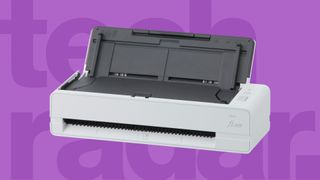
1. Best for documents
2. Best for photos
3. Best for basics
4. Best portable
5. Best for small businesses
6. FAQs
7. How we test
Finding the best scanner is crucial for both office and home office settings, as it offers a convenient and accurate way to digitize documents and printed materials for archiving and sharing.
While the best all-in-one printer with scanning capabilities provides a compact solution for digitizing documents and photos, the best standalone scanners excel in delivering high-fidelity reproductions, making them indispensable for a robust backup strategy.
In our search for the best scanner, we've extensively tested various models to suit different needs, from business requirements to budget-friendly options. Our comprehensive review process involved comparing scanning speeds, output resolutions, and build quality. We also evaluated the intuitiveness of each scanner, its pricing, and overall performance to ensure that our recommendations cater to a wide range of users.
Additionally, considering the importance of digital document management, we've included insights on the best cloud storage and best photo storage and sharing sites. These services enhance the functionality of scanners by providing secure and accessible platforms for storing and sharing scanned documents.
For those who work extensively with PDFs, we've also explored the best Adobe Acrobat alternatives, the best PDF editors, and the best free PDF editors. These tools, combined with the best scanners, create a comprehensive document management system. They allow for efficient editing, annotation, and sharing of scanned documents.
Moreover, don't forget to check out the best cloud backup and best free cloud storage options to provide additional layers of security for any digital documents you scan. Our guide aims to help you find the best scanner that not only meets your scanning needs but also integrates seamlessly into your wider document management and storage solutions.
The best scanner of 2024 in full:
Why you can trust TechRadar
Below you'll find full write-ups for each of the entries on our best scanner list. We've tested each one extensively, so you can be sure that our recommendations can be trusted.
Best scanner for documents
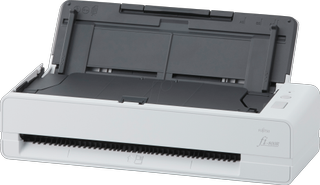
1. Fujitsu Image Scanner fi-800R
Specifications
Reasons to buy
Reasons to avoid
The Fujitsu Image Scanner fi-800R - also known as the Ricoh fi-800R - is a compact and fast document scanner with some impressive features that make it truly one of the best scanners around right now. The fi-800r includes Fujitsu's return scan and U-Turn scan technology, and it has a return scan feature. On top of all of that, this scanner also is smart enough to auto align and straighten out the files being scanned utilizing it's Active Skew Correction technology.
Fujitsu's Image Scanner fi-800R is sadly limited by simply a USB connection, however we haven't seen that stop people from grabbing this scanner for work, especially work on the go, or work in smaller office spaces. In these scenarios, relying on a quick and easy USB connection is sometimes even preferred.
Best scanner for photos
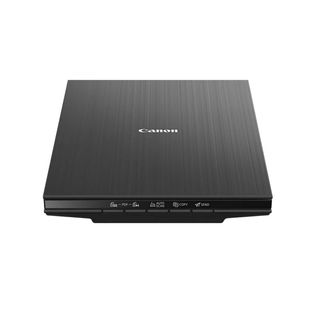
2. Canon CanoScan LiDE 400
Specifications
The Canon CanoScan LiDE 400 is a classic flatbed scanner, great for photos and documents. With a scanner like this, there is no hopper to load up several documents or photos at a time. Instead, each file needs to be loaded one by one.
Something interesting about this scanner is that rather than laying flat on a desk or table, this scanner has a kickstand that will help it angle up a bit.
Continuing on, this model has some advancements in its ability to scan text documents and even process them better compared to previous models. However, like other scanners, this model is still only a wired connection. No Wi-Fi, no Bluetooth. All that being said, this is a very easy to use and quality scanner that is great for images, and documents alike.
Best for basics
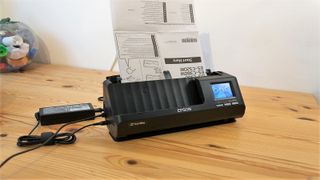
Specifications
Reasons to buy
Reasons to avoid
Not everyone needs huge scanners that can eat document piles in seconds and spit out any paperclips left in them, and the Epson ES-C380W was designed for those less demanding jobs.
Able to run up to 20 pages at a time through its double-sided scanner, the Epson ES-C380W is simple to use, has a small desktop footprint and is light enough to carry to a remote site. In addition to handling bulk paper processing, it also has an alternative flat paper path that can cope with thicker input up to 5mm deep. But it can‘t scan books, regrettably. The scan speed is 30 pages per minute for text documents and double that for images, although that assumes you can reload the 20-page bin very smartly.
Once pages are scanned, they can be directed to network locations or Cloud storage using the Epson ScanSmart tools. In addition to this redirection, there are some other workflow-friendly features, like blank page skipping, that can save time and effort for those using it.
One issue with this design is that it appears somewhat flimsy, and it only comes with a single year of warranty. Another problem is the relatively high price compared with similar Canon and Fujitsu offerings. If this scanner were cheaper and slightly better made, and Epson sold it outside Europe, we’d be more impressed.
Read our full Epson ES-C380W review .
Best portable scanner
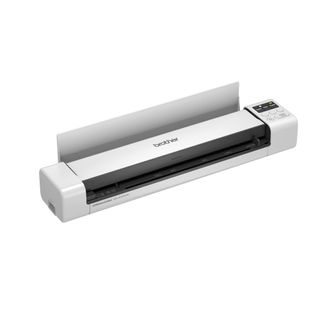
4. Brother DSmobile DS-940DW
Specifications
Reasons to buy
Reasons to avoid
The Brother DSmobile DS-940DW is a portable document scanner that is easy to use and has both Wi-Fi and USB 3.0 connectivity. Unlike many other scanners, this one actually has rechargeable batteries, allowing it to be operated without being plugged in for maximum portability.
All in all, this scanner is a fantastic value for a manually fed portable document scanner, especially one with the companion software that is available. This may not be the document scanner you choose for large scanning jobs, but it's pretty handy to have for if you are on the go, or just need to scan occasionally and don't want a large scanner on your desk.
Best scanner for small businesses
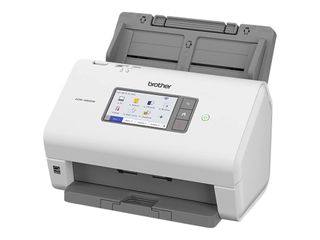
5. Brother ADS-4900W
Specifications
Reasons to buy
Reasons to avoid
The Brother ADS-4900W is a mid-range document scanner with a reasonable price tag of $700. The scans from this machine are accurate and efficient and quite fast, especially for the small size of this scanner. For those who need to scan files to simply store on a flash drive, this ADS-4900W can scan direct to flash drive without the use of a computer at all. Compared to other, similar scanners, this model is a bit lighter and smaller, making it a great on the go scanner, as well as one that is tucked out of the way for the occasional use.
One downside of this scanner, for some, is the lack of solid Mac support. However, for PC users, there are a number of companion applications that can help make sure all is running smoothly
Best scanners: FAQs
What is a scanner?
A scanner is an electronic machine that captures text and images from physical documents and converts them in digital formats. These converted digital scans are generally stored on computers, and can be viewed and edited using computer apps.
How can I scan and digitize old photos?
The best scanners provide a great way to digitize old photos, letting you modify images in the best photo editors or pairing the process with the best cloud storage to securely back-up your pictures.
Scanning and digitizing old photos is fairly straightforward, provided your scanner has good accuracy for capturing every shot. The process works the same as scanning documents. Alternatively, some apps, like Microsoft's Office Lens, let you use your phone to capture physical media and covert them to digital images.
You can find out more in our guide How to scan and digitize old photos.
How to choose the best scanner for your needs
When choosing the best scanner for yourself, start with evaluating whether you want a dedicated device - most of the best all-in-one printers feature scanning tools, although they may not match the accuracy of a fully focused scanner. Also consider what you're scanning, as alongside scanners for documents, the best photo scanners excel at reproducing images.
You'll want to consider the size of the documents you plan to scan. If they're tiny photos, a small scanner will work well. But if you need to scan larger sizes of photos and documents, then a large scanner is apt.
You'll then want to check the scanner's resolution. The higher the resolution, the better the digitized quality of the documents. 1200 to 3200 dpi is suitable if you plan to scale up scans to decorate your home, but 300 dpi should be fine for most other cases.
Lastly, you'll want to look out for the network connectivity features, scanning enhancements, scanning speed, and the machine's price.
How we test the best scanners
Every year, we test hundreds of office equipment essentials, from the best printers for WFH to the best small business printers and the best standing desks.
Whether we're rating the best office chairs or scanning tools for digitizing and backing up documents, we undertake a rigorous testing process to uncover the products are best for every use-case.
To test the best scanners, we compare scanning resolution, scanning speed, and designs. We assess any additional functionality, like printing and copying, and evaluated if they added enhancements to the digitized scans.
During our comprehensive evaluation of each model, we explore paper capacity, scan quality, network connectivity, and dimensions. We also explore what types of users the scanners are best suited to, and whether user interface was intuitive and easy to use.
Lastly, we considered whether the scanners had additional features like card reader compatibility and ADF, and their pricing - from premium models to value for money options.
Get in touch
- Want to find out about commercial or marketing opportunities? Click here
- Out of date info, errors, complaints or broken links? Give us a nudge
- Got a suggestion for a product or service provider? Message us directly
- You've reached the end of the page. Jump back up to the top ^
Are you a pro? Subscribe to our newsletter
Sign up to the TechRadar Pro newsletter to get all the top news, opinion, features and guidance your business needs to succeed!
Former TechRadar Pro B2B Hardware Editor, Collin has been in journalism for years, with experience in small and large markets, including Gearadical, DailyBeast, FutureNet, and more.
- Mark Pickavance
- Desire AthowManaging Editor, TechRadar Pro
- John LoefflerComponents Editor
- Steve ClarkB2B Editor - Creative & Hardware

